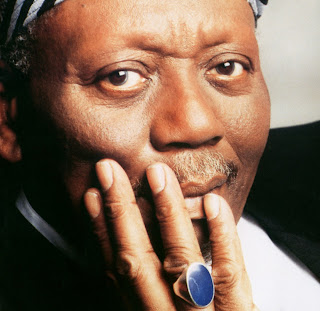 NICK DERISO: “The Spirits of Our Ancestors,” pianist Randy Weston’s vibrant exploration of the African roots within jazz, remains a rapturous delight in any language.
NICK DERISO: “The Spirits of Our Ancestors,” pianist Randy Weston’s vibrant exploration of the African roots within jazz, remains a rapturous delight in any language.
Legends Dizzy Gillespie, Idris Muhammad, longtime Basie sideman Benny Powell and Pharoah Sanders appear, while groundbreaking trombonist Melba Liston — then working for the first time with Weston since suffering a stroke in the mid-1980s — provides arrangements. Together with Weston, they help construct a recording that is complex and elementary at the same time, one that speaks to the past even while challenging us to embrace a future best built together.
That begins with the opening track “African Village Bedford-Stuyvesant,” a solo piano piece which links the complex relationships and street-level vibe of the Brooklyn neighborhood where Weston grew up with other, similar communities from generations before. (Weston discusses Brooklyn’s unique sense of community in embedded video below.)
Weston continues adding layers as the two-CD project, long but never ponderous, grows in complexity. His original concept, following a multi-album tribute to his more modern influences called “Portraits,” was to record in the traditional rhythms of the Gnaoua, the black healers of Morocco with whom he had lived for a number of years. (That group’s mysticism is perhaps best heard on Weston’s “Blue Moses,” an adaptation of a Gnaoua spiritual, featuring Sanders.) A planned trip to the sub-Saharan area of Africa to put down tracks was scrubbed, however, by the Gulf War in 1991 — though Weston continued forward with his theme.
Liston, working through computer programming since her right side was paralyzed, provided the same unpredictably beautiful yet empathetic flourishes that defined classic collaborations with Weston like “Highlife” and the four-movement “Uhuru Afrika” suite in the early 1960s — and, earlier, had helped her become the first woman to crack into all-male horn sections with the likes of Basie, Quincy Jones and, of course, Gillespie.
 Her distinctive touch is felt on the nimble and then jabbing redo of 1964’s “African Cookbook,” which starts as a slow boil on this Antilles release only to quicken eventually (thanks to twin bass lines by Alex Blake and Jamil Nasser) into a popping sizzle. Dewey Redman (in your left ear) and Sanders (in your right) are the spicy highlights of a multi-instrumental exploration across the song’s middle.
Her distinctive touch is felt on the nimble and then jabbing redo of 1964’s “African Cookbook,” which starts as a slow boil on this Antilles release only to quicken eventually (thanks to twin bass lines by Alex Blake and Jamil Nasser) into a popping sizzle. Dewey Redman (in your left ear) and Sanders (in your right) are the spicy highlights of a multi-instrumental exploration across the song’s middle.
“The Call” features a powerful cadence, often referred to as a Bata rhythm, that mimics the human heart. A traditional spiritual dominated by Gnaoua beats called “La Elaha-Ella Allah/Morad Allah” makes a compelling case for turning to God.
But “The Spirits of Our Ancestors” doesn’t simply iron on patches of tonal and rhythmic influences from Africa, so much as completely reorganize jazz within one of its most important ancestral incarnations. And this galloping group of improvisers, playing with clarity and fierce emotion, pushes the concept across all of the musical disciplines — not just the rhythm section.
“The Healer,” an undulating triumph, recalls the majesty and mysticism so often associated with the ancient civilizations of Egypt. “The Seventh Queen” is best described as an African blues.
The project concludes with twin moments of sparkling uplift — first with “African Sunrise” then a final solo turn by Weston, “A Prayer For Us All.” On the first, we find Gillespie — for whom Weston had written the tune years ago — immersing himself in trademark gurgling, giggling joy.
There is an intellect here, and passion, on par with Duke Ellington and John Coltrane. “The Spirits of Our Ancestors,” definitive in its originality, completes a stirring musical journey Weston began in the 1960s — and, in the end, cements a spot in the legacy for this underappreciated pianist.
- Nick DeRiso’s Best of 2015 (Rock + Pop): Death Cab for Cutie, Joe Jackson, Toto + Others - January 18, 2016
- Nick DeRiso’s Best of 2015 (Blues, Jazz + R&B): Boz Scaggs, Gavin Harrison, Alabama Shakes - January 10, 2016
- Nick DeRiso’s Best of 2015 (Reissues + Live): John Oates, Led Zeppelin, Yes, Faces + others - January 7, 2016




Weston is a tremendous artist, and I’m afraid he isn’t heard as much as he deserves to be. The Monk side he did as part of the “Portraits” series is the best Monk tribute I have ever heard, true to the source and distinctive at the same time, but like a lot of his work it is not in print. The best plan with Weston is to snap up his stuff when it is released– and by all means catch him live.